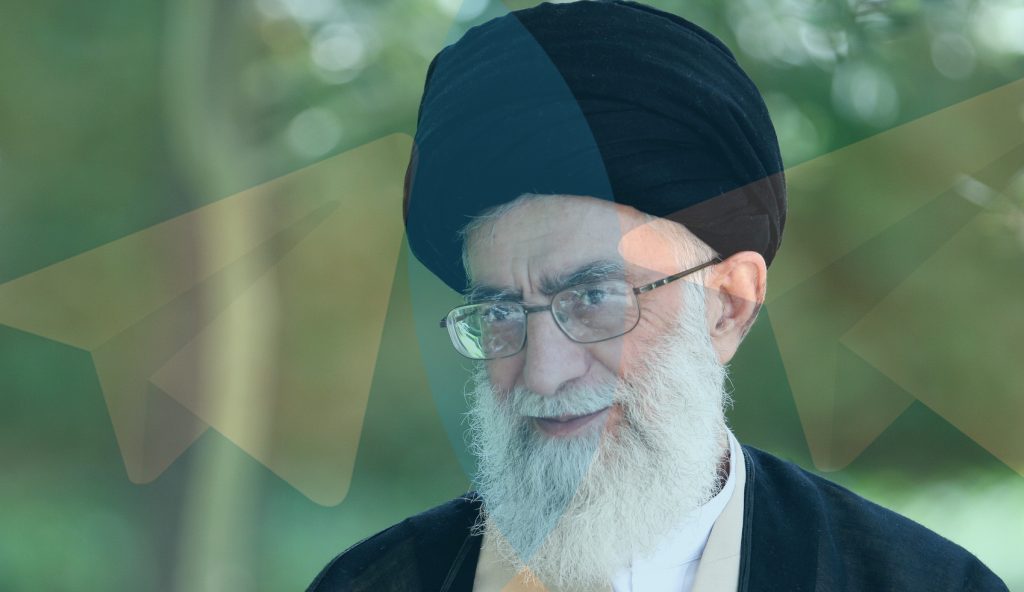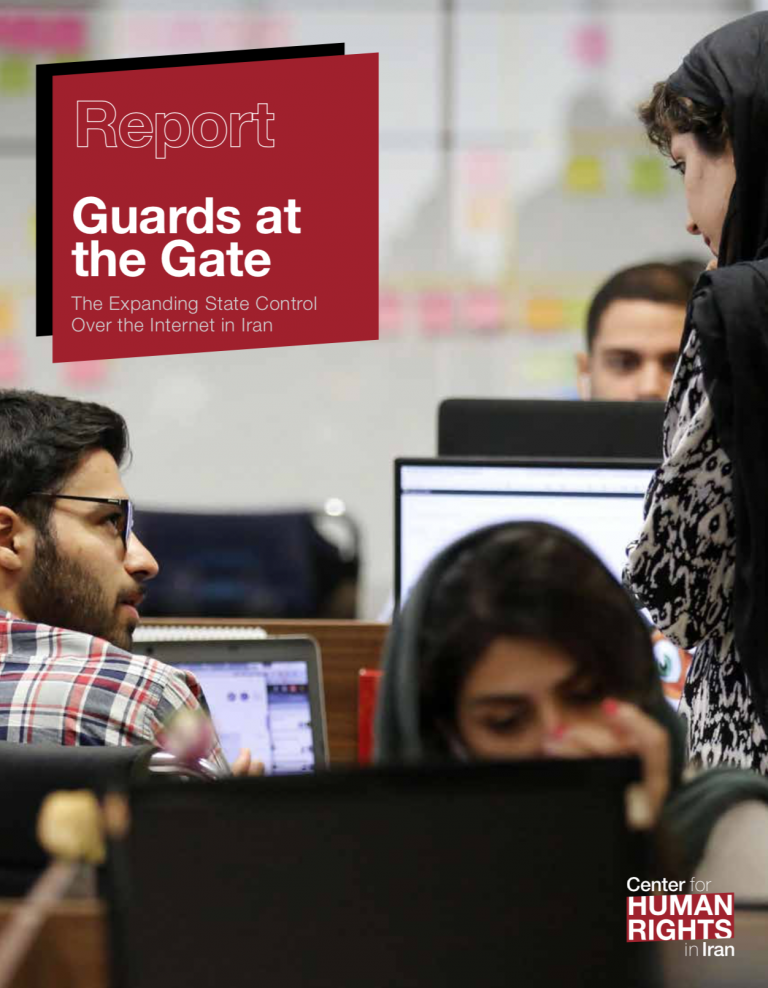Khamenei’s Dropping of Telegram Channel Lays Groundwork for Banning Messaging App
 Most Iranians Distrust Domestic Messaging Apps, Will Use VPNs to Stay on Telegram
Most Iranians Distrust Domestic Messaging Apps, Will Use VPNs to Stay on Telegram
Two days after the secretary of Iran’s Supreme Cyberspace Council (SCC) announced Telegram could be blocked “at any moment,” a message was posted on Supreme Leader Ayatollah Ali Khamenei’s Telegram page announcing it was ending its activities.
Khamenei’s move has moved the country one step closer to the blocking of Telegram, the messaging app used by more than 40 million members in Iran.
The discontinuation of Khamenei’s page, which has close to one million followers, coincides with other state efforts to encourage people to use only domestic messaging apps that the state can control—efforts which have so far have failed in an environment where foreign apps are still available. Khamenei’s action makes it much more difficult for Iranian government officials, personalities and domestic media to continue to use Telegram and increases the pressure on them to migrate to domestic messengers that the state can censor and monitor.
The message on Khamenei’s page states: “In line with safeguarding national security, and to eliminate Telegram messenger’s monopoly, as of this moment the information portal for the office in charge of preserving and publishing Grand Ayatollah Khamenei’s material — KHAMENEI.IR — will cease its activities on this messenger. This action by KHAMENEI.IR, which is taking place in advance of official plans by the country’s institutions to end the use of Telegram, is intended to support domestic messengers and end the monopoly of cyberspace by non-Iranian apps.”
The message said news and information about the Iranian leader would now be posted on Gap, Soroush and iGap.
Following the move, the Fars news agency, affiliated with Iran’s Islamic Revolutionary Guards Corp (IRGC), issued its own similar statement: “To support domestic messengers and end the monopoly of cyberspace by non-Iranian messengers, Fars news agency will soon continue the activities of its news channel only on domestic messengers.”

The report “Guards at the Gate: The Expanding State Control Over the Internet in Iran,” published by the Center for Human Rights in Iran (CHRI) in January 2018, explains the state policies and actions to censor and monitor the online activities of Iranians.
The public relations office of the Guardian Council, the clerical body that vets all legislation for conformity with Islamic law in Iran, also announced: “To safeguard national security and support domestic products, this council has ceased activities on Telegram,” according to the Iranian Student News Agency (ISNA).
These steps reinforce other steps the authorities in Iran have taken to erode the use of Telegram in the country. Reza Jowhari, the head of the presidency’s Strategic Management Center, issued a directive to all executive branch agencies and organizations under the authority of the executive branch to stop using foreign messaging apps for official business and communications.
According to an ISNA news agency report on April 18, the directive states in part: “Based on Article 7 of the SCC’s ruling regarding policies and actions toward social messengers, all government and [affiliated public] organizations, must conduct information sharing exclusively on domestic social messengers officially selected by the Ministry of Information and Communications Technology. It is evident that any use of foreign social messengers for office communications and services remains prohibited.”
The Ministry of Education also issued a directive on April 16 banning the use of foreign-made messaging apps at public schools throughout the country.
Taken together, these moves appear to be laying the groundwork for a total ban on Telegram.
Despite these coordinated state actions, it is unlikely that blocking Telegram will have a major impact on its use in Iran, given Telegram’s wide presence in the people’s daily lives. If Telegram is blocked, users will be forced to use VPNs to access it but this is what they are already doing, widely and effectively, to access Facebook and Twitter, which are also blocked in Iran.
Based on official statements, when Telegram was blocked for two weeks during street disturbances in early January 2018, more than 30 million people used filter-blockers to access Telegram.
Iranian users’ have reacted to these moves to restrict use of Telegram by expressing their displeasure on other networks such as Twitter.
Journalist Sadegh Hosseini tweeted on April 18: “The officials who are getting out of Telegram should not think that because of them 40 million Iranians will stop using this messenger.”
The distrust of domestic messengers is due to the domination of security, intelligence and judicial agencies over the country’s internet infrastructure, and the inability to protect online privacy when using domestic communication tools and services. There is serious doubt regarding the success of domestic messengers despite their financial and legal backing from the state.
In recent years, domestic messengers have not made progress in the presence of messengers whose servers are outside Iran. The foreign messengers have resisted efforts by Iranian officials to censor their content or violate the privacy of Iranian users.
Previously President Hassan Rouhani had said that more than 100,000 people had lost their jobs as a result of blocking Telegram for two weeks in early January 2018. In response to concerns over the impact on businesses if Telegram is blocked, Firouzabadi, the secretary of the SCC, has tried to calm such concerns by announcing unemployment insurance for those who lose their jobs as a result of blocking Telegram. However, this hasty announcement has raised serious questions about the state’s ability to back the plan.
Criticizing the plan, internet activist Alireza Shirazi tweeted on April 17 : “They are saying they will offer insurance to those who lose money from Telegram’s closure… First of all, what law are you basing it on? Secondly, where did you find the budget for it? Thirdly, have those doing business on Telegram paid unemployment insurance tax? Fourthly, what right do you have to make such false promises out of people’s pockets?”
Babaei, another Iranian on Twitter, wrote on April 17: “Firouzabadi, the SCC secretary, says those who lose money as a result of blocking Telegram will get unemployment insurance! According to what law, which insurance fund, what budget? For how long are you going to reach into the people’s pockets and the public treasury to pay the cost of wrong policies?”
Banning Foreign Messengers by Government and Public Institutions
Meanwhile, banning Telegram for government agencies before the network has been blocked in Iran, brought this reaction from journalist Hossein Dehbashi on his Twitter page on April 17: “What right does the Education Ministry have to ban the use of Telegram and Instagram in schools before they are filtered by law? How many authorities are running this government?”
President Rouhani’s chief of staff Mahmoud Vaezi said on April 18, “As a government, we are not saying no one has the right to use foreign messengers.” He added that the government does not give itself the right to prevent people from accessing information without a judicial order. He stressed: “The person in charge of announcing the news about whether or not the government has made any decision regarding Telegram is (Information and Communications Technology Minister) Mr. Jahromi.”
In addition to state agencies, media organizations close to the security establishment and Iran’s supreme leader, First Vice President Eshaq Jahangiri and other officials have also stopped their activities on Telegram.
Conditions for Foreign Messengers to Continue Operations in Iran
Abdolsamad Khorramabadi, the secretary of the Taskforce to Determine Instances of Criminal Content (TDICC), told ISNA news agency on April 18, 2018, “If the foreign messaging app operating in Iran does not implement the judiciary’s order regarding the deletion of criminal content, it will be accountable.”
Khorramabadi set conditions for the operation of foreign messaging networks in Iran and said, “The first condition for foreign messaging apps to continue their operations in the country is that they have to get an operating license from the relevant authorities.”
Khorramabadi, who is also deputy prosecutor general in charge of cyberspace affairs, said: “According to the rulings of the SCC, no foreign messaging service is allowed to operate in Iran, without complying with these conditions: They have to get an operating license from relevant legal authorities such as the Intelligence Ministry; save and process data related to Iranian users inside Iran; do not give the data to foreigners under any circumstances and prevent access to the data; completely observe laws and regulations about the protection and preservation of users’ privacy; and have an authoritative official representative inside the country to conduct operations and respond to judicial inquiries.”
Khorramabadi continued: “Foreign messengers operating in Iran also have to comply with criminal laws and regulations that ban the publication of criminal content. Based on these laws and regulations, they are obliged to delete such content as soon as they become aware of their publication in their cyber network. Of course, the primary responsibility for the publication of criminal content is with the person who has published them, but the foreign messengers will be criminally liable as an accomplice if they consciously continue to allow such content to be published.”
In compliance with a TDICC order, the Cafe Bazaar app store in Iran has removed a version of Telegram that includes a filter breaker and replaced it with an older version, according to a report in Peivast, an Iranian tech weekly, on April 18.
“Speaking to Peivast, Cafe Bazaar’s public relations office announced that the removal of Telegram’s latest version has been carried out on orders of the TDICC but the taskforce did not give a reason.” The weekly added in another tweet: “Based on what we have heard, the removal of Telegram’s latest version (from Cafe Bazaar) is probably because Telegram had included the capability to circumvent filters.”
The last version of Telegram on Google Play app store is 4.8.5 while the newest version on Cafe Bazaar is 4.8.4 and therefore Iranian users have to download the latest original version from Google Play.
The TDICC’s action not only prevents access to content on the internet, it also compromises the security of Iranian users. The latest versions of all apps include changes that remove bugs and fix security issues and vulnerabilities. As such the TDICC’s action has endangered the security of Iranian users.






